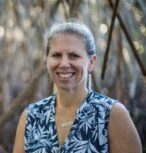DNA reveals the past and future of coral reefs
New DNA techniques are being used to understand how coral reacted to the end of the last ice age in order to better predict how they will cope with current changes to the climate. James Cook Univer

From 2005 to 2022, the main node of the ARC Centre of Excellence for Coral Reef Studies was headquartered at James Cook University in Townsville, Queensland (Australia)








Abstract: Research from the Pacific Islands during the past decade has linked watershed modification to degradation in downstream freshwater and coral reef communities. However, even creative communication of these messages has not been enough to inspire behaviour change with respect to decision-making around upstream land use. Focused work in Fiji on incidence in water-related disease, such as typhoid, has shown that some drivers of disease risk in people (e.g., riparian forest loss, density of road networks) are also associated with negative impacts on fish species and coral reef benthos. These findings have provided the evidence base for the design of the innovative Watershed Interventions for Systems Health in Fiji (WISH Fiji) project. WISH Fiji is a model case for transdisciplinary and sectoral cooperation through the implementation of holistic integrated watershed management, combining nature-based solutions with water and sanitation infrastructure improvements to achieve multiple simultaneous benefits for human and environmental health. Watershed management interventions are being co-designed with local communities and government to address factors affecting whole-of-system health at nested scales. The science leading up to the development of the WISH Fiji project will be shared, along with the next steps for mainstreaming and scaling integrated watershed management through predictive models that can identify targeted areas for investment and innovative platforms of blended finance.
Biography: Stacy Jupiter is the Melanesia Regional Director for the Wildlife Conservation Society (WCS), based out of Suva, Fiji, where she previously directed WCS’s Fiji Country Program. Originally from the U.S., she completed her undergraduate studies at Harvard University and doctoral research at the University of California, Santa Cruz and at the University of Queensland while on a Fulbright scholarship. She was a postdoc with the Centre of Excellence for Coral Reef Studies between 2006 and 2008, in a joint position with the Australian National University and Australian Institute of Marine Science. Broadly, the scope of Stacy’s work could be captured under the umbrella of integrated catchment-to-reef management, though this has taken various forms, including: evaluating effectiveness of locally-managed marine areas and integrated island management projects; undertaking spatial planning to achieve biodiversity and livelihoods outcomes; assessing downstream impacts of catchment modification on biodiversity and human health; and understanding drivers of resilience in Pacific coastal communities. Stacy was named a 2019 MacArthur Fellow.
New DNA techniques are being used to understand how coral reacted to the end of the last ice age in order to better predict how they will cope with current changes to the climate. James Cook Univer
A new study on the effects of climate change in five tropical countries has found fisheries are in more trouble than agriculture, and poor people are in the most danger. Distinguished Profess
James Cook University researchers have found brightly coloured fish are becoming increasingly rare as coral declines, with the phenomenon likely to get worse in the future. Christopher Hemingson, a
Researchers working with stakeholders in the Great Barrier Reef region have come up with ideas on how groups responsible for looking after the reef can operate more effectively when the next bleaching
Abstract: As marine species adapt to climate change, their heat tolerance will likely be under strong selection. Individual variation in heat tolerance and its heritability underpin the potential fo
Abstract: The Reef Ecology Lab in KAUST’s Red Sea Research Center explores many aspects of movement ecology of marine organisms, ranging from adult migrations to intergenerational larval dispersal
Abstract: Macroalgal meadows are a prominent, yet often maligned component of the tropical seascape. Our work at Ningaloo reef in WA demonstrate that canopy forming macroalgae provide habitat for ad
Abstract: Sharks are generally perceived as strong and fearsome animals. With fossils dating back at least 420 million years, sharks are not only majestic top predators but they also outlived dinosa
Abstract: Connectivity plays a vital role in many ecosystems through its effects on fundamental ecological and evolutionary processes. Its consequences for populations and metapopulations have been
Abstract: Evolution of many eukaryotic organisms is affected by interactions with microbes. Microbial symbioses can ultimately reflect host’s diet, habitat range, and even body shape. However, how
Abstract: The past few years have seen unprecedented coral bleaching and mortality on the Great Barrier Reef (GBR) but the consequences of this on biodiversity are not yet known. This talk will expl